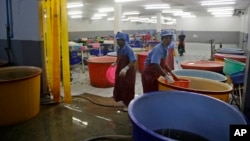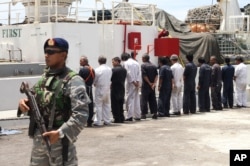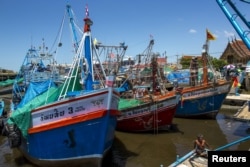The United States and European Union are keeping up pressure on Thailand to continue with reforms in its fishing industry to resolve issues such as slave labor and the exploitation of seafood plant workers. The measures by the Thai Government are seen by analysts as key steps in a bid to boost Thailand’s rating in the U.S.’s annual Trafficking in Persons (TIP) report due later this year.
The world’s third largest seafood exporter, has faced intense pressure to reform work practices in the multimillion-dollar seafood export industry, which is threatened by sanctions in markets such as the European Union and United States.
The measures have had some effect and a European Union delegation recently granted Thailand a six month reprieve from sanctions to further solve the problems of illegal, unreported and unregulated (IUU) fishing.
U.S. closes loophole
U.S. President Barack Obama recently signed legislation banning all U.S. imports of products made or caught by slave labor, closing a legal loophole in existence since 1930, potentially affecting U.S. market access for Thai seafood.
Over the past two years, investigations and reporting of abuses in the seafood industry triggered a raft of measures by the Thai military government to curb abuses, ranging from legislation, to crackdowns on fishing vessels and seafood processing plants employing migrant labor.
In the southern seaside province of Phangna, Myanmar national Htoo Chit, president of a foundation assisting migrant worker seafarers, believes there has been progress in addressing many of the issues faced by the industry.
“I’ve always said compared to the previous time, the current government is the most active and most interested [in] working for these human rights issue[s] and [human] trafficking, especially in the seafood industry. They try to collaborate with NGOs [on-government organizations] like us. Since last year, the Thai government has tried to resolve these problems,” he said.
Major seafood industry exporters, including Thai Union Frozen Products, with annual sales of $3.5 billion, were forced to cut ties with suppliers linked to slave labor.
Slave labor, trafficking
Australian-Japanese seafood exporter, Kingfisher Holdings, in a statement said it has taken steps to tighten policies and practices after reports linked some of its suppliers to using illegal labor to its products. The measures include mandatory certification for all raw material supplies from the sea.
Panitan Wattanayagorn, an advisor to the Thai Deputy Prime Minister, Prawit Wongsuwan, who held talks with the European Union delegation, said the Thai Government is committed to implementing policies and laws affecting the seafood industry.
“There is a policy of zero tolerance in these areas. Trafficking is a very complicated issue, it involves many agencies, but the government is committed and very serious about pursuing to implement new measures, in upgrading the measures, in upgrading the law on fishery problems and on trafficking issues,” he stated.
But others, including several non-government organizations (NGOs), remain cautious amid concerns over policy transparency with law enforcement often considered an area of weakness.
Andy Hall, a migration researcher and labor activist, said while some progress has been made in addressing the issues, including migrant worker registration, more needs to be done.
“Certainly there seems to have been a lot of changes. But whether that’s led to some kind of reduction in exploitation is very difficult to say. I mean we see the policies that are coming out from the government that are really not making much sense in terms of having a long term migration policy that promotes human security," Hall said. "So we’re still very skeptical that there has been significant improvements.”
Government advisor Panitan also agrees there is “still quite some way to go” to address the labor issues in the seafood industry.
But analysts say Thailand’s challenge is to be upgraded on the U.S.’s Trafficking in Person’s (TIP) ratings after remaining on the report’s lowest level of Tier 3 last year.
Panitan believes Thailand has taken sufficient steps to be upgraded to Tier 2 and failure to achieve the goal would, he says, “send the wrong signal” given the policy changes.
A U.S. TIP assessment of Thailand’s labor and trafficking measures is due to be completed by the end March, with the U.S. expected to release its worldwide assessment report on human trafficking by mid-year.






